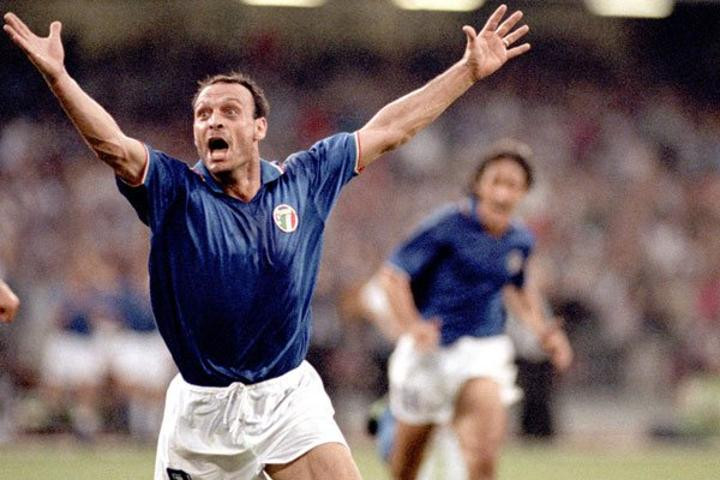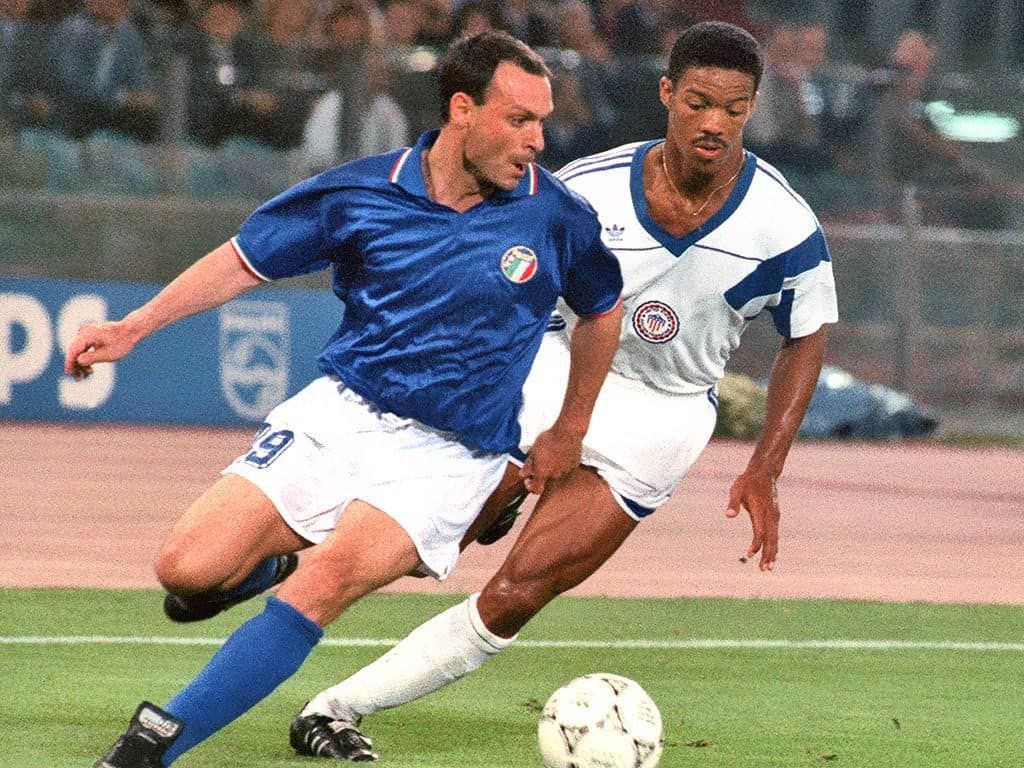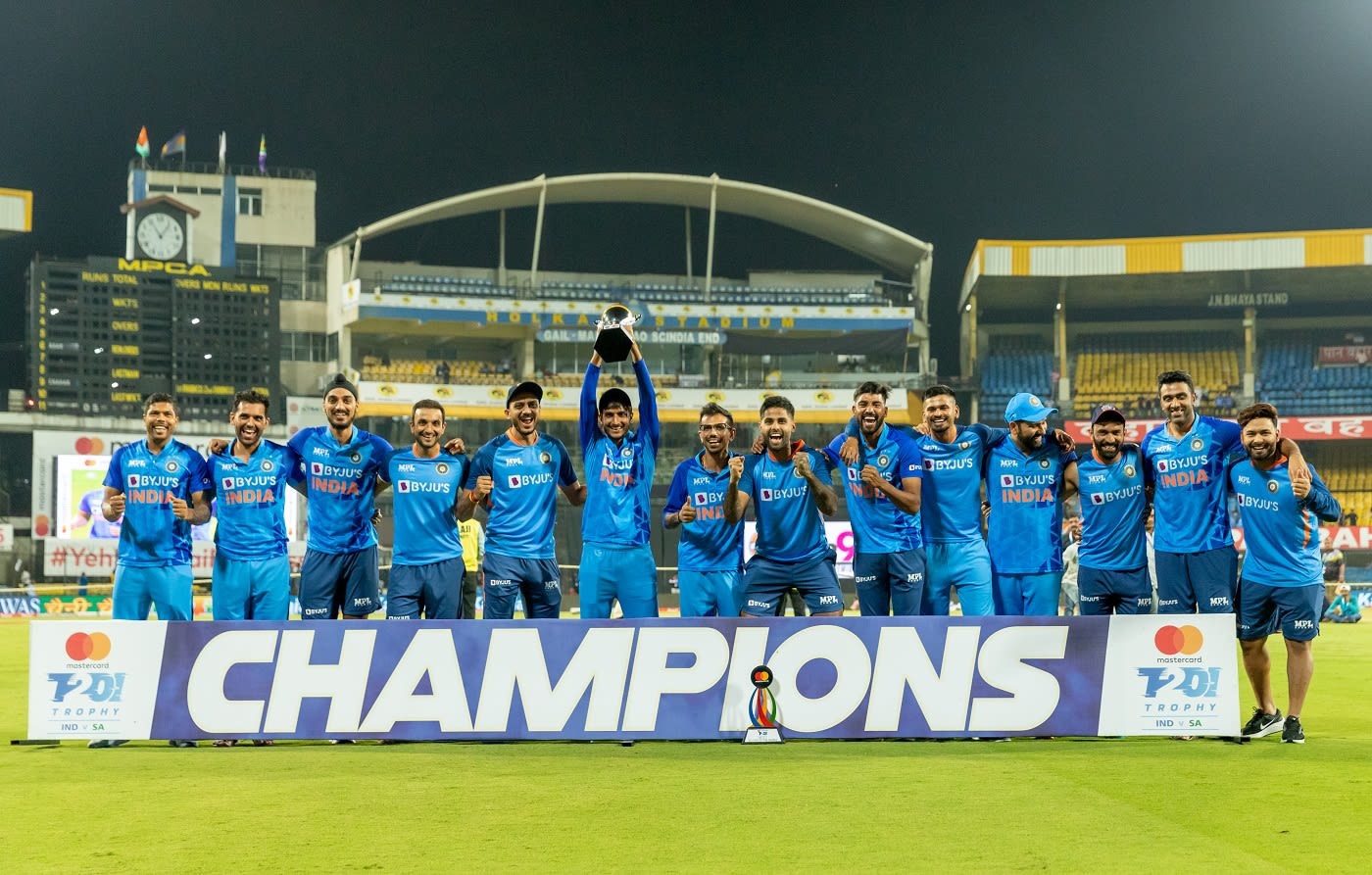Former Italy forward Salvatore "Toto" Schillaci has died aged 59, the Palermo hospital where he was being treated for colon cancer said a statement on Wednesday. Schillaci rose to international fame at the 1990 World Cup in Italy, where he starred for the Azzurri, scoring six goals to win the golden boot. Italy went on to finish third in the tournament, but Schillaci's personal efforts were rewarded, beating Lothar Matthäus and Diego Maradona to win the golden ball as the tournament's best player. Schillaci's death has prompted tributes from across the football world, with many remembering his iconic performances at the 1990 World Cup. "A football icon is leaving us, a man who has entered the hearts of Italians and sports fans around the world," Italy's prime minister Giorgia Meloni posted on X. "Salvatore Schillaci, known by everyone as Toto, the striker from the magic nights of Italia '90 with our national team. Thanks for the emotions you gave us, for having made us dream, celebrate, embrace, and wave our national flag. Bon voyage, champion." Schillaci was born in Palermo, Sicily, and began his career playing for local amateur teams. He was a late bloomer and made his professional debut at the age of 22. He was initially overlooked for the 1990 World Cup squad but was called up as a late replacement. His performances in that tournament, including his iconic goal celebration and the winning penalty in the third-place playoff against England, cemented his status as a national hero. He was also awarded the Golden Boot as the tournament's top scorer and the Golden Ball as the tournament's best player. After the 1990 World Cup, Schillaci's career began to decline. He played for Juventus, Inter Milan, and Jubilo Iwata in Japan, but he never quite reached the heights of his World Cup success. Despite his declining career, Schillaci's legacy remains intact. He is still fondly remembered by fans for his passionate performances and his charismatic personality. He is also revered for his contributions to the Italian national team, particularly at the 1990 World Cup. Schillaci's death is a loss for the football world. He was a player who embodied the spirit of the game, a true champion who inspired countless fans. He will be sorely missed.
Schillaci’s Rise to Stardom
Salvatore 'Toto' Schillaci, who has died aged 59, provided the defining images of Italia ‘90 as his wild-eyed, arms-outstretched goal celebration transformed a virtual unknown into a national hero and global superstar. Schillaci’s elevated status may have flickered only briefly in the playing context but the humble striker born into poverty in Palermo became a towering personality when the World Cup was staged in his homeland. If Paul Gascoigne’s tears after being sent off in the semi-final against West Germany in Turin remain the enduring symbol of England’s Italian campaign, it is Schillaci’s back story and famous celebration that grabbed the attention of the wider world. Schillaci for a few short weeks joined the ranks of the world’s most famous sporting figures as he provided some of the most memorable moments in a disappointing tournament that history has actually remembered more kindly than it should. He only made his Italy debut in March 1990 - a late developer at 25 - and was widely expected to be a peripheral figure in coach Azeglio Vicini’s squad, even though he had helped Juventus win the Uefa Cup with a two-leg victory over Fiorentina weeks before. Schillaci was Vicini’s final pick, the player himself only expecting to watch from the stands. Instead, he went on to win the World Cup’s Golden Boot with six goals, capturing the hearts of Italy and beyond with his all-action style and that trademark goal celebration. Schillaci also won the Golden Ball as the tournament’s best player and subsequently finished second in the Ballon d’Or behind West Germany captain Lothar Matthaus later that year. The moment that changed Schillaci’s life came on 9 June 1990 as Italy struggled to break down Austria in their first game in Rome’s Stadio Olimpico, when he met Gianluca Vialli’s right-wing cross to rise and power home a 79th-minute header just three minutes after coming on as substitute. Schillaci raced off towards the touchline, almost in disbelief, pumping his arms out wide and staring wide-eyed, lost in the ecstasy of celebration. He looked like he would not stop running until he was brought to a halt, swamped by elated Italy team-mates. An unlikely superstar was born. Vicini resisted the temptation to start Schillaci, who came on as a substitute, in the narrow win over the USA but bowed to national demands to play the tough Sicilian alongside the great Roberto Baggio against the Czech Republic. Schillaci and Baggio both scored in a 2-0 win and were soon hailed as a dream ticket, the headline on the front of Gazzetta Dello Sport reading, 'Italy in delirium with Schillaci and Baggio. How beautiful you are'. The remarkable tale continued with Schillaci scoring one and making another for Aldo Serena as Uruguay were beaten in the last 16. He ended the Republic of Ireland’s superb World Cup campaign at the quarter-final stage with the decisive strike in a 1-0 win, also scoring against Argentina in the last four only for the dream to die as Italy went out on penalties. Italia ‘90 ended on a personal high as he scored a late penalty as the hosts beat England 2-1 to secure third place. He was the recipient of a generous gesture from Baggio, who stepped aside as penalty taker to give Schillaci the chance to end as the tournament’s top scorer ahead of Czech Republic striker Tomas Skuhravy. Baggio’s decision showed that Schillaci’s down-to-earth personality and selfless playing style had made him a figure as popular with his Italy team-mates as he was with the rest of the world. As far as Italy was concerned, Schillaci was now immortal, forever recognised in his home country, with stories of children and animals – including thoroughbred horses – named after the man who started his career being paid £1.50 a goal for a local amateur side.
Schillaci's Legacy
Schillaci’s World Cup story lived on but the playing glory did not. The goals dried up for club and country, with him scoring only one more goal for Italy, ending with seven in 16 appearances – six in those glorious Italia ‘90 weeks that will remain forever with everyone who shared the experience. West Germany won the World Cup in a miserable final against Argentina but mention Italia ‘90 – outside England at least – and the first name and image that springs to mind for many will be Schillaci, his memorable glorious release and the facial expression of an joyous goalscorer. He told BBC Sport in 2014 that he knew exactly what people would say as soon as they recognised him: “The eyes. The eyes. Every time I meet people they want me to do the ‘wild eyes’. It was an instinctive gesture that has stuck in people’s minds. I have done it many, many times.” Schillaci left Juventus for Inter Milan in 1992 but it was a move undermined by injuries and a loss of form. He ended his career in more prolific fashion at Jubilo Iwata in Japan, the first Italian to play in the fledgling J-League. He returned to Palmermo after his career ended, continuing his 'man of the people' lifestyle and image that so many could relate to - not just in Italy but around the world - as this familiar, famous figure moving around the city on his scooter. Schillaci’s footballing story can effectively be encapsulated by that fleeting golden period in Italy’s summer of 1990 – but is a story that will burn forever in the memory of all who experienced it.
A Lasting Impression
Schillaci will be remembered as one of the great Italian footballers. His impact on the 1990 World Cup was undeniable. He was a true hero, a man who captured the hearts of millions with his passion, his skill, and his unforgettable goal celebration. His death is a loss for the football world. He will be sorely missed.


















